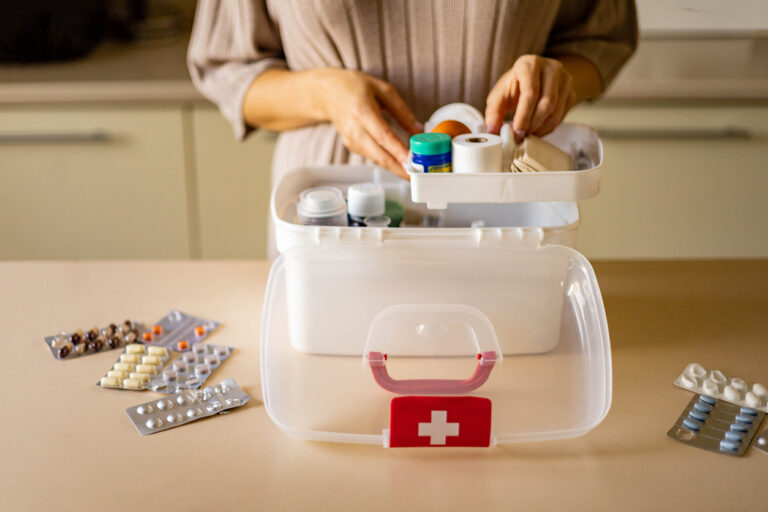Chronic health concerns are difficult to manage in the best of times. When a hurricane is making its way to Bermuda, stress for people with medical conditions can increase exponentially.
Property damage, power outages, limited access to emergency services—there are countless reasons why hurricanes can prove to be quite traumatic for individuals living with many specific medical conditions.
Diabetics who need to maintain a supply of insulin at the proper temperature, for example, may have an acute fear of their power going out, thereby putting their insulin supply at risk of spoilage. Fortunately, the U.S. Department of Health and Human Services provides some comfort for those worried about insulin spoilage. It turns out that insulin products contained in vials or cartridges supplied by the manufacturers (opened or unopened) may be left unrefrigerated at a temperature between 59°F and 86°F for up to 28 days and continue to work. “However, insulin switching should always be done in consultation with a doctor. Before a disaster strikes, diabetic patients should learn about insulin storage and switching in an emergency.”
Of course, our weather here in Bermuda can, quite regularly, reach temperatures of 86°F after a hurricane, so learning about insulin switching is definitely good advice!
Folks who need oxygen or constant access to technology to keep them well, however, may also suffer some anxiety around power outages, which are quite routine during a Bermuda hurricane. Planning, of course, is key, and medical experts recommend stocking a full two-week supply (at least!) of all the medication you will require during a hurricane.
Stocking medicine, while very necessary, doesn’t solve the power outage issue though. Ideally, all patients who require large, electronic machines to maintain their health will have access to a generator. Insurance companies will even provide these where needed. This, however, is not an ideal world, so adhering to expert medical tips and strategies for managing chronic medical conditions during a hurricane is vital.
The experts at Island Health Services (IHS) advise having a full supply of prescription drugs and other medical equipment, dressings, pain medication and whatever else is required. For patients requiring oxygen, IHS recommends a battery operated O2 concentrator, or a small generator—which must be operated outside.
If a patient lives alone, a fully charged cell phone is a must! Choosing to move in with family so that they can provide assistance during the storm would be very wise. For serious medical issues, IHS recommends, possibly moving in with family who live close to the King Edward Memorial Hospital (KEMH), or at least family who live west of the Causeway, which will close at some point during a hurricane, as a matter of protocol.
Fortunately for those living East of the Causeway, the Lamb Foggo Urgent Care (LFUC) facility is functional during hurricanes, but no one should venture out during a storm. Pregnant women who may be close to term, or in a high-risk category, will often be admitted to KEMH at their physician’s discretion and ride out the storm there. To ensure that such cases are duly covered, one obstetrician will move into the hospital for the duration of the storm, together with a surgeon and anesthesiologist.
If evacuation is a part of your emergency care plan, consulting with your health-care provider and their team is imperative, especially for people who receive intense treatments like chemotherapy and dialysis.
Other things that need to be secured when preparing for a hurricane are medical documents, including immunization records, social insurance information, health insurance cards, contact numbers for all professional medical care providers (most doctors will answer calls during an emergency if they can) and prescriptions.
Those living alone may find it prudent to get a medical ID, which can alert emergency response workers to vital information, like medicinal allergies, chronic conditions and special care requirements. This device will be especially helpful in the event that a patient becomes unconscious or incapacitated.
Bermudians tend to weather storms quite well, but that extra bit of care and attention to preparedness is very necessary for many of us. We need to listen to our bodies more intently than ever when storms are brewing, because, when the outside elements are swirling in a deadly way, we don’t need our bodies to fail too.
A medical travel kit is an essential for patients who may need to relocate for safety reasons. People living east of the Causeway, or on the south coast, where storm surges tend to wreak special havoc, making trauma and anxiety rise just as high as the raging waters, should always be prepared to evacuate at a moment’s notice. Having a medical travel kit packed and ready for “go time” could mean the difference between life and death for these patients.
Your kit should be waterproof to protect documentation and medications that may be vulnerable to spoilage in water. Experts also recommend that your medical supply kit include necessary medical equipment such as blood sugar monitoring equipment, hearing aids, eyeglasses and extra batteries. To prevent the spread of respiratory viruses such as the flu, pneumonia and COVID-19 while staying in a community shelter, it’s a good idea to pack items like face masks, hand sanitizers disinfectant wipes.
People who are deaf or hard of hearing should include emergency communication tools like a dry erase board and markers to make it easier for EMTs or people who don’t know sign language to communicate with them. Patients with wheelchairs should keep patch kits for flat tires and an air pump in their medical kits.
Finally, the medical professionals at IHS say that doctors do make house calls before and after hurricanes, but they advise very limited movement during the storm. Staying out of the dangerous weather is, after all, the best health plan any of us have during a hurricane.

